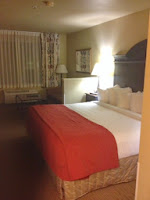I have to say, the drive here was nothing like my drive from Fresno to Salinas after my last conference. As I mentioned in an earlier blog, I was not impressed with the Sacramento Valley between my hometown and Chico. Leaving Chico and heading west, I was equally unimpressed. It wasn't until I got close to the Coastal Range that things began to look a little less depressing. In the shadow of the foothills, I saw neat rows of fruit trees and lines of grapevines. Everything was lush and green--nothing like what I expect the place will look like in a few months. Here there were no rusted warehouses and delapidated farm equipment, no mile upon mile of used car lots like I saw on the drive to Chico. The surroundings made for a pretty scene.
I made my way slowly west and south, through the twisty roads into the Napa Valley and eventually along the Russian River to Jenner. I went through some cute little towns, like Duncans Mills (who knew?) and some kind of ugly towns, like Clearlake. I saw huge coastal redwoods and lots of people parked to take the hike at Robert Louis Stevenson state park. I passed on RLS when I learned that the damn place has no actual RLS memoribilia. The park surrounds the site where RLS and his new bride honeymooned in an abandoned shack back in the 1880s. Even the shack is gone now, and the only thing left is a marker on the spot where it once stood. It seems that the five-mile hike to the top of the park provides glorious views of the sea and, on clear days, even as far as San Francisco. But a five-mile hike had nothing to recommend it to me on this beautiful spring day.
So, I came to Jenner. There is a marine layer over the sun as I look out the window at the end of the river and the ocean front. A few hardy souls are walking along the beach, and I hope to join them when I'm done with my lunch. Mama needs some beach time after the big conference and before heading home to buckle down before exams.
I was lucky to stumble along River's End right as I entered town. I had seen this on Yelp with great reviews, but I didn't want to go some place with a lot of people and hassle. But, with a parking spot right in front of the door, I could hardly ignore the sign that beckoned me inside. And I'm so glad I came in. Lunch has consisted of a 101 North IPA with a burger and fries. I'm currently awaiting the arrival of my favorite dessert, creme brulee. Yummy!!
101 North IPA - delicious!
Western burger with fries and this
fancy-tasting catsup
Who puts fruit in a creme brulee?
Bitches!!!
One thing that continues to disappoint during this drive is the lack of history I feel. Nothing tickles me more than to imagine things as they might have been back in the past. In Fresno, I enjoyed the company of Jack London's fictional Billy and Saxon and could imagine the world they would have seen after the turn of the century. But here, there was none of that. Everything I've seen today seems to have sprung up during the 1960s. It's all quaint and consciously rustic--it wants people to come and "enjoy the great outdoors." But its like Highway 50 at the Y. It's all a sham. No history remains here that I can see. The Native Americans that must have run up and down this part of the coast are obliterated. I can't imagine old times here at all.
That's not to say that there's no history here. Of course, people have come and gone from here for centuries. And I'm sure if I drove up the coast for 10 miles, I'd feel something at the sight of Fort Ross. I would remember the story of the Russian count who fell in love with the Spanish governor's daughter, and I would recall that John Sutter bought much of the Fort's goods for his own Fort in Sacramento.
But that's up the road, and I'm heading down the road....
....It's several hours later, and I'm back at home. It was an amazing weekend for me, winning the award and running all over the Northern California coast. I'm tuckered out, and will now need to gear up for the coming two weeks of exam-prep hell. Yikes!!






















